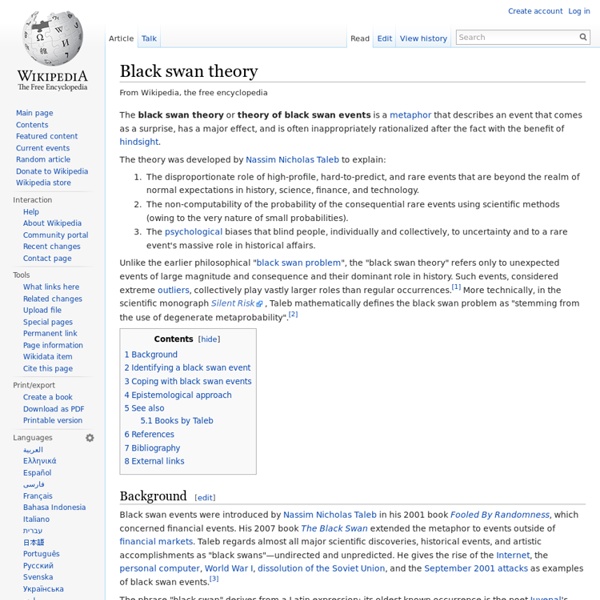The Black Swan (Taleb book)
book about mathematical finance The Black Swan: The Impact of the Highly Improbable is a 2007 book by author and former options trader Nassim Nicholas Taleb. The book focuses on the extreme impact of rare and unpredictable outlier events—and the human tendency to find simplistic explanations for these events, retrospectively. The book covers subjects relating to knowledge, aesthetics, as well as ways of life, and uses elements of fiction and anecdotes from the author's life to elaborate his theories. Coping with Black Swan events[edit] A central idea in Taleb's book is not to attempt to predict Black Swan events, but to build robustness to negative events and an ability to exploit positive events. The book asserts that a "Black Swan" event depends on the observer: for example, what may be a Black Swan surprise for a turkey is not a Black Swan surprise for its butcher. Summary[edit] Taleb acknowledges a contradiction in the book. Argument[edit] Reception[edit] See also[edit] Notes[edit]
Mathematical and Quantitative Papers
A mixture of my lectures, & musings when I am bored, ranging from probability theory & quantitative finance to computational epistemology. Collected Published Papers (in One Volume) New Paper on Errors Aims of the lectures: In short, statistics without being an idiot savant. · Pre- asymptotics (all that happens takes place outside the limit), · Inverse Problems (many models can explain the same phenomena), and · Platonicities (the reduction of the fool) are the same illness under different symptoms. Probability theory does not have to be Platonic. You can go from empiricism to formalism --looking for inverse problems and sensitivity to error in the choice of model. Lecture 1 – Platonic convergence & the Central Limit Theorem. Lecture 2 - Preasymptotics & Small Sample Effects of α ≤1 or Saint Petersburgh -Style Infinite First Moment Situations. Lecture 3 - The fundamental problem of the 0th moment and the irrelevance of "naked probability" Lecture 6 - Option Pricing & True Fat tails
2X Entrepreneur Turned Venture Capitalist | Both Sides of The Table
Herd Behaviour
AS & A2 Economics - Intensive Exam Coaching & Revision Workshops: Book Now! Stratford | Fulham | Bristol | Birmingham | Gateshead | Leeds | Manchester Monday, November 28, 2011 PrintEmailTweet This! Professor Andrew Oswald from the University of Warwick delivered a pitch-perfect lecture on the significance of herd behaviour in his talk at the LSE tonight. Why has the Economics discipline been so tawdry in understanding better some of the Biology and Psychology behind the behaviour of groups? Herding is associated with behavioural traits such as copying, clustering, imitating and conformity. Paul Ormerod makes some revealing and instructive comments on copying in this excellent video from a recent RSA talk. One of Oswald’s arguments is that in the majority of circumstances, our natural, perhaps sub-conscious instincts to herd serve us well. It turns out that your relative position in the crowd matters a lot! Have a look at your wrists! Why does herding behaviour matter? Dates and Locations
10 European Startups To Watch in 2011
When you hear Silicon Valley discuss the European startup scene it’s often negatively. Some say that the investors aren’t brave enough, some say the entrepreneurs aren’t bold enough. Whether there’s any truth in these accusations or not, the fact is that there are startups across Europe that are brimming with original ideas and creativity. Following on from our 10 Exciting European Startups from 2010, here are 10 startups to look out for in 2011. Pearltrees Visitors to the LeWeb conference last month couldn’t have failed to spot Pearltrees. Pearltrees makes organising groups of links to content incredibly easy. Recent additions to the service include real-time group collaboration and a touch-screen based interface which will be ported to the iPad soon. Planely The idea behind Planely is a certainly niche one, but the Danish startup could well be onto something that frequent air travellers will love. Geomium LikeOurselves Storific Datasift SuperMarmite Viewdle Screach Shutl
Guide to Evaluating Startup Ideas - Tony Wright's Startup Front-End -
A great developer I once worked with was kvetching at lunch one day. He’d been working at a well-funded startup for about a year and had come to terms with the fact that the startup was really a pretty dumb idea. He’d wasted a year of his life and had a pile of stock options that weren’t very interesting. His last two jobs had been similar. He asked me a question that, at the time, I didn’t have a good answer for. Since I’ve announced that I’m moving on in the coming weeks/months, I’ve been bombarded with cool offers at existing startups, larger companies, and, of course, I’ve been pondering some of my own startup ideas. So without further ado, here is my “checklist for good startup ideas”. How deeply do you think the startup will effect people’s lives? That’s my list.



